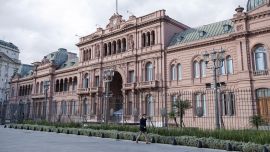Argentina expects a favourable response from its creditors to its new bond swap offer formalised last Tuesday, an indispensable process for its economic recovery from the debacle left by the coronavirus pandemic.
Almost three months after presenting its first proposal for restructuring some US$66 billion in bonds issued under foreign legislation, Argentina announced that it had submitted an amended offer to the Securities & Exchange Commission (SEC) of the United States running up to August 4.
"It’s the biggest and last effort we can make," said President Alberto Fernández when announcing it last Sunday.
Favourable reactions of a surge of up to 20 percent for Argentine shares quoted on Wall Street along with a 9.01 percent rise for the Merval stock exchange index back in Buenos Aires led to expectations that the offer might be presented on Monday evening but it was finally postponed until Tuesday. Two investment funds, Gramercy and Fintech Advisory, expressed their approval of the new proposal.
Creditors entering the swap stand to obtain 53.5 cents for every dollar loaned as against 39 cents in the first offer rejected by most creditors.
"Obviously this is a much improved offer, a good proposal because it more or less falls within the range of creditor demands and also Argentina’s conditions," economic analyst Sebastián Maril told AFP.
The offer shortens the period before payments commence from three years to one, improving the return on both capital and interest. In total, Argentina commits itself to cancelling US$2.1 billion of debt by 2023 as against US$300 million under the initial proposal presented in April, according to the calculations of the economist Nery Persichini.
The most difficult step
With the economy in recession since 2018 and the impact of the pandemic translating into a Gross Domestic Product shrinkage of 9.9 percent as estimated by the International Monetary Fund (IMF), sealing the deal on restructuring the debt is vital for Argentina.
"It’s the first step towards recovery and also the most difficult," considers Maril.
An agreement would permit the country to emerge from the default incurred in May when interest to the tune of some US$500 million in bonds subject to the swap went unpaid. But restructuring the debt issued under local legislation or owed to multilateral organisms still lies ahead. Argentina’s public debt totals around US$324 billion, almost 90 percent of GDP.
"Restructuring the debt and overcoming the coronavirus pandemic are two necessary conditions for economic growth. The problem is that they are not sufficient conditions," said Matías Rajnerman, the chief economist of Ecolatina consultants.
"They must placate the pressures on the exchange markets and return to consumption and investment, for which more certainty is needed to generate confidence," indicated the economist.
The pandemic has affected agricultural exports, Argentina’s main wealth, apart from hitting the other economic activities and employment. In May Argentina’s exports were US$5.06 billion, representing a fall of 16.3 percent as against the same month in 2019.
"Argentina has gigantic potential but has installed an incredible amount of bureaucratic, monetary and trade unionist red tape. It does not have a dynamic economy which permits rapid recovery," maintains Maril.
"Furthermore, we are in a world totally transformed by the pandemic and it remains to be seen if it wants to buy Argentine products and if tourists will want to come to Argentina," he added.
The fine print
Beyond the improvement, the market still awaits the legal aspects contained in the new offer, the text of whose legal chapter remains unknown.
In recent weeks the government differed sharply with the Ad Hoc and Exchange bondholder groups over the class action clauses defining the percentage of creditors who must be in agreement for the debt to be restructured.
"Those groups are a tough bone to chew in these negotiations. But the positive aspect is that there is time until August 4 to join the swap and some fine-tuning is always possible," considered Persichini.
by Nina Negron, AFP
) Funds 'much improved offer'






















Comments